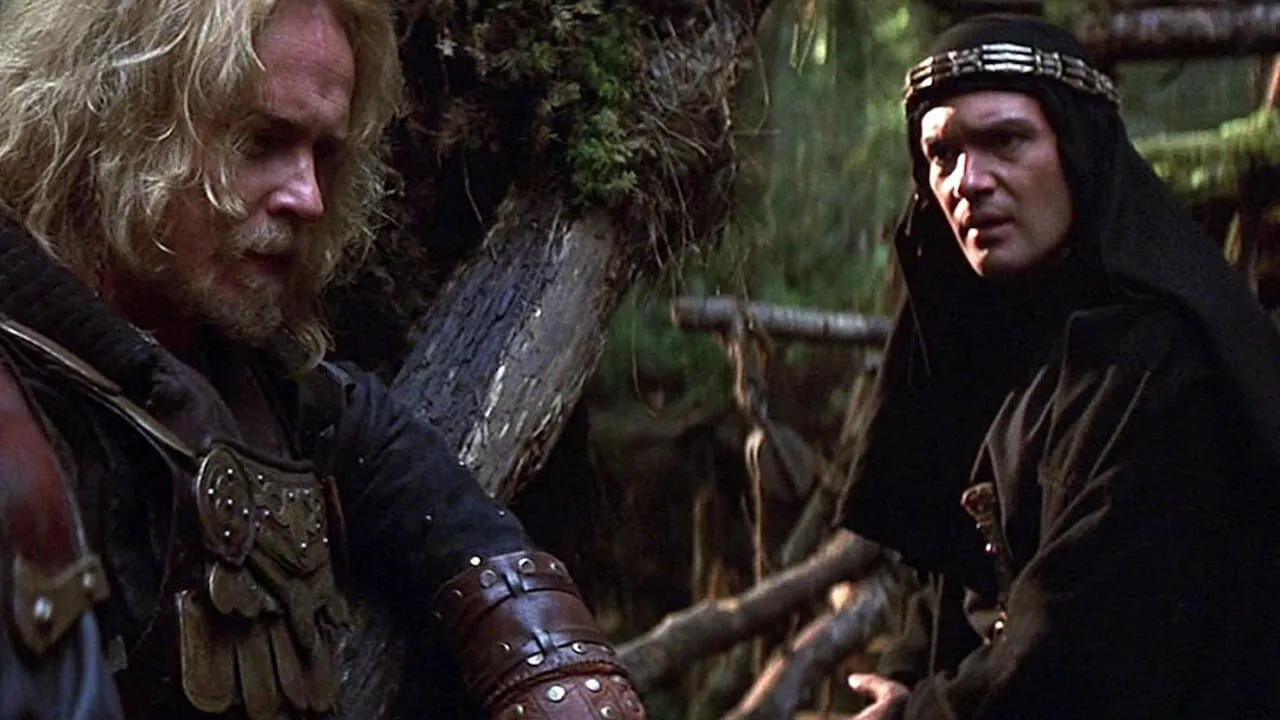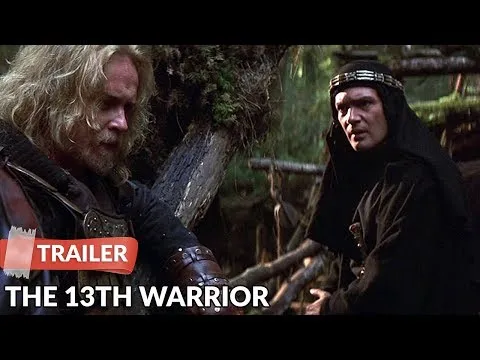
Michael Crichton has earned his place in history books as creator of “techno-thriller” literary genre due to novels that would later serve as basis for many popular and even some groundbreaking films, like Jurassic Park. When reputation is so lofty, such authors can even afford to have some of their novels turned into spectacular screen failures. In case of Chricton that was his 1976 novel Eaters of the Dead, adapted in 1999 into The 13th Warrior, historic film directed by John McTiernan.
Although Chricton is primarily known for techno-thrillers, his opus was rather diverse and included many novels of historic fiction. Inspiration for Eaters of the Dead came from the writings of Ahmad ibn Fadlan, 10th Century Arab scholar and diplomat who had travelled to Volga River valley in today’s Russia. Crichton decided to use those writings as basis on the plot which was additionally inspired by Beowulf, early medieval epic which is considered one of the earliest grand works of English literature. Ahmad ibn Fadlan is the film’s protagonist, played by Antonio Banderas, and the script begins with him falling out of favour of Abbasid caliph Al-Muqtadir because caliph’s wife has fallen in love with him. He is given mission to travel to steppes and forests of Central Asia and today’s Russia and establish diplomatic contacts with various nomadic tribes and states. Accompanied by old friend and interpreter Melchisdek (played by Omar Shariff), he meets group of wandering Norsemen led by Herger (played by Dennis Storhøi). Ibn Fadlan is at first not particularly enthusiastic about them, due to their lack of hygiene and civilised manners. However, he would ultimately have to join them. Far north, their homeland, ruled by King Hrothgar (played by Sven Wollter) became target of mysterious enemy – Wendols, who correspond to invisible cannibals from ancient Norse legends. Prophecy tells that the kingdom will be rescued by thirteen warriors, with the thirteenth warrior being a foreigner. Ibn Fadlan concludes that he must play that role so he joins Herger and prince Buliwyf (played by Vladimir Kulich) and their band. As he travels north, he gradually learns Norse language and begins to appreciate their valour, while trying to bring them some of the benefits of Islamic civilisation.
The Thirteenth Warrior was supposed to be a great film or, at least, deliver what Gladiator delivered a year later. Its story promised an epic featuring mystery, action, a little bit horror and spectacular reconstruction of distant, exotic past. Even with some previous misfires, like Congo, Crichton’s name behind the source material was likely to bring quality on the screen and especially when the film was directed by John McTiernan, by that time established as one of the greatest action directors of Hollywood. However, production, which was mostly taking place on British Columbia locations, was beset by all kinds of difficulties. Many of them stemmed from creative differences between McTiernan and producers and dilemmas whether extremely bloody and violent content of Chricton’s novel should be removed in order to maintain family-friendly image of Disney, studio behind the project, or not. That and constant rise of budget led McTiernan to leave the project and quickly direct cheaper but more successful The Thomas Crown Affair, forcing Chricton to finish the film. With bloated budget, failure at the box office was guaranteed, and The Thirteenth Warrior, which was also savaged by critics, turned into one of the most notorious fiascos of late 20th Century Hollywood.
It would be unfair to say that The Thirteenth Warrior doesn’t have any redeeming qualities. The most important is fascinating subject and Chricton’s desire to avoid certain cliches and stereotypes. The Thirteenth Warrior is one of the rare Hollywood films showing early medieval Europe outside Christian perspective. There aren’t Christian characters in the film – they are either Muslims or pagans. Furthermore, Arabs, who used to be portrayed as violent bloodthirsty barbarians in most of late 20th Century Hollywood films are here shown as embodiment of sophisticated culture and civilisation.
But all that is for nought, because The Thirteenth Warrior fails to be an engaging film, mostly due to mishandled script and direction that makes it look unfinished. Even the action scenes, that are supposed to be McTiernan’s forte, look underwhelming or confusing, often because of cinematography by Peter Menzies Jr. that looks too dark at times. Many of potentially fascinating characters are undeveloped. And even the final battle scene, which is supposed to be the most spectacular, represents huge disappointment, especially those who are somewhat familiar with early medieval history and certain logistical challenges characteristic for warfare in that period, which is completely ignored in typical Hollywood fashion.
Although ultimately watchable, at least for viewers with really low expectations or those strangely curious about major Hollywood flops, The Thirteenth Warrior still represents massive disappointment.
RATING: 3/10 (+)
Blog in Croatian https://draxblog.com
Blog in English https://draxreview.wordpress.com/
Leofinance blog @drax.leo
Unstoppable Domains: https://unstoppabledomains.com/?ref=3fc23fc42c1b417
Hiveonboard: https://hiveonboard.com?ref=drax
Bitcoin Lightning HIVE donations: https://v4v.app/v1/lnurlp/qrcode/drax
Rising Star game: https://www.risingstargame.com?referrer=drax
1Inch: https://1inch.exchange/#/r/0x83823d8CCB74F828148258BB4457642124b1328e
BTC donations: 1EWxiMiP6iiG9rger3NuUSd6HByaxQWafG
ETH donations: 0xB305F144323b99e6f8b1d66f5D7DE78B498C32A7

